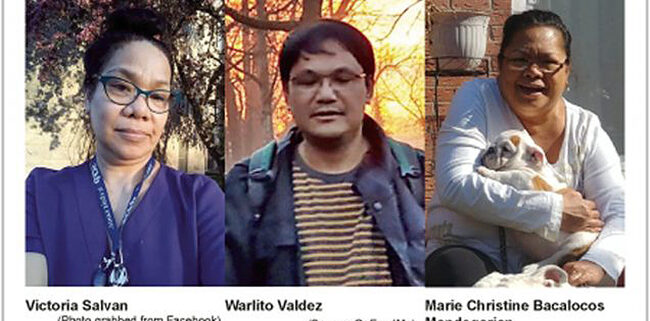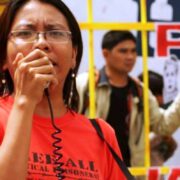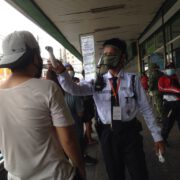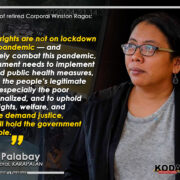COVID-19 takes toll among Fil-Canadians
By Ysh Cabana
TORONTO, Canada–Several people were reported to have died from coronavirus in Canada, including Filipinos.
With the Canada death toll at 1,580 deaths, according to Public Health Agency of Canada as of April 19, the Filipino community is hard hit.
Many Filipino-Canadians are working in the health sector in roles including nurses, care aide, facility maintenance and as “front-line essential” workers during the Coronavirus Disease 2019 (COVID-19) pandemic.

Marie Christine Bacalocos Mandegarian, 54, succumbed to the virus on April 15 less than 24 hours after testing positive.
“I am a little bit scared, but duty calls,” she wrote on her Facebook account last month. “I can’t stay home, I’m a healthcare worker” she said. For 31 years, Mandegarian, worked as a personal support worker at Altamont Care Community, a long-term care center in Scarborough, Toronto.
Mandegarian was the first health worker in Toronto and second in the province of Ontario to die of COVID-19.

On April 9, Brampton Civic Hospital mourned the loss of their environmental services associate Ronald V. David. Uncle Ronald, 58, as he was fondly called, is believed to be the first known Ontario health-care worker to die after getting sick with the highly contagious respiratory disease.
Health-care staff make up about 11% of all reported COVID-19 cases in the province but make up only about three% of Ontario’s population.
The province is also reporting outbreaks of COVID-19 at long-term care homes where nearly half of total coronavirus-linked deaths in Canada happen according to chief public health officer Teresa Tam.
“We know that close to half of the deaths that we’re tracking are linked to long-term care facilities, but that ratio is actually different in different provinces,” Tam told reporters during her daily ministerial update on the virus.
Other Filipino victims of COVID-19 in Canada include Victoria Salvan, 64, who as a patient attendant. She immigrated to Canada from the Phillipines, and worked with senior citizens for 25 years.

Salvan, or Vicky to her colleagues, passed away April 17 just weeks away from retirement. She is survived by her husband and two children. One of Salvan’s sons said that she cared deeply for the elders in her care working overtime up to her final days of work at the understaffed Grace Dart Extended Care Centre, where nearly a quarter of the residents have been infected with COVID-19, according to public health records.

Warlito Valdez, 47, had been a residential worker at Pendleton House run by the Richmond Society for Community Living helping people with intellectual and physical disabilities.
Valdez died April 5 despite being in self-isolation following a positive COVID-19 diagnosis. According to a GoFundMe page that Valdez’s co-workers started, he was a “tireless provider” who worked multiple jobs. His wife Flozier Tabangin, who also works as a frontline care worker, described her husband as “a hero”
According to the Philippine Department of Foreign Affairs (DFA), the total number of COVID-19 cases among overseas Filipinos across 42 countries rose to 990. The number of overseas Filipino fatalities is now at 143 as of its April 20 report.
“The DFA remains committed to ensure the welfare of our people and stands ready to provide assistance to the COVID-19 positive Filipino nationals as needed,” it said.
A number of others continue to fight for their livelihood where Covid-19 is believed to have been on an outbreak making a hard job perilous.
In the province of Manitoba, the first presumptive case of COVID-19 is a woman in her 40s from the Winnipeg Regional Health Authority. The province says she was exposed to the virus through travel to the Philippines.
More than 850,00 people of Filipino descent are living in Canada, with settlement primarily in major urban areas, according to the 2016 census.
The country’s supply of health care workers is impacted by government’s reliance on immigration making the Filipino community one of the major sources of Canada’s health care providers who may be registered nurses or unregulated workers, such as nursing aides and orderlies.
Some Filipino workers, however, have raised concerns of being discriminated against and unprotected from the virus due to a shortage of personal protective equipment (PPE).
In the province of Alberta, Cargill Meat Processing Plant is vital to a bourgeoning immigrant community of Filipinos. Workers there tell Canadian media of poor working conditions and fears of viral transmission in an overcrowded “elbow-to-elbow” facility.
Meanwhile, advocacy groups, including Tulayan Filipino Diaspora Society, Sulong UBC, and Migrante BC, have penned an open letter calling on all levels of the Canadian government for “increased and timely resources” to be available for Filipino workers.
“The general feedback we are getting from our community is the lack of accessible information regarding the pandemic in Filipino languages. While we are doing our best as a community to translate and offer support to each other at this difficult time, we would like to ensure that Filipinos in Canada are getting direct and accurate information from the proper health authorities,” the groups said in the letter. #
= = = =
This report also appeared on The Philippine Reporter.







